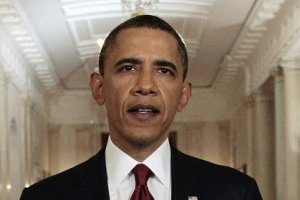
The Candidates and Foreign Policy 2012
I'm going to be perfectly honest here and admit that my opinions about American foreign policy have been in flux over the last few years. During the Bush administration, it would be safe to say I leaned very heavily to the right, having supported both the Patriot Act and the war in Iraq. I still believe in going after Al Qaeda and other forms of violent Islamic radicalism that threaten us at home, and I still believe that it is important for America to exude strength and power. However, like most Americans these days, I am exhausted by war and the apparent lack of progress in the Middle East. With the war in Iraq all but over and the war in Afghanistan winding down, I often wonder if it was all worth it. Sure, Osama bin Laden is dead, but only a fool would argue that Al Qaeda and Islamic extremism are no longer threats, that another major terrorist attack can't happen on American soil tomorrow.
 | | "I personally swam across the ocean, walked all the way to Pakistan, kicked in the door, said something cheesy but awesome, and shot Bin Laden in the face, all by myself. It was the most badass thing anybody has ever done in the history of ever, and I will keep reminding you that I did it until you re-elect me." |
I understand those who want to cut our losses completely, get out of the Middle East altogether, stop sending foreign aid to nations that are lukewarm allies at best, cynically accept that nation-building can never work, and just stay the heck out of foreign affairs. However, I don't believe that a policy of absolute neutrality can ever work; our first five presidential administrations tried their best and failed spectacularly. Instead, I think there is a fine line between necessary and proper intervention and imperial overextension, and good foreign policy knows how best to walk along it. I believe it is absolutely essential to maintain the best and most modern military the world can muster if we wish to maintain American exceptionalism on the world stage, but I also think it's all too easy to make the rest of the world resent us for acting like the world's bossy, gun-toting parent.
So, knowing that it would be impossible to appease violent Islamic extremists without flying the black flag of Islam over our cities--and knowing that they will continue to kill Americans, civilians and soldiers alike--I know that we cannot bring an end to the so-called "War on Terror" through apologetic diplomacy and military retreat. I also don't think we can end it by bombing the Middle East into oblivion or sending troops into the streets of Tehran. Sufficed to say, the solutions to this--and every other foreign policy issue facing America--are more complex and nuanced than either extreme would have you believe. These issues are incredibly important and consequential, but they are difficult to water down into thirty second sound bites and simple, ideologically-driven generalizations. As such, I consider myself a true independent where foreign policy is concerned, needing to be convinced by anyone seeking the highest office that his specific visions for the next four years of American foreign policy are wise.
Defense Spending and Foreign Aid
I'm going to anger my more right-leaning friends and family when I say we don't need to be spending as much as we are on national defense. We should be spending a lot, of course, and maintaining our position as world leader so that no nation can mess with us head-on. At the same time, though, when thousands of American citizens can be killed by a dozen suicidal extremists with a few two dollar boxcutters, we can no longer afford a Cold War mentality in which the nation that builds the biggest arsenal is truly safe. Despite what many would have you believe, there are plenty of ways we can cut our spending without drastically reducing the size and strength of our military. As for foreign aid, we can and should carefully evaluate the cost effectiveness of every dollar spent, not just in terms of how much humanitarian assistance those dollars purchase (which is unfortately pretty small) but also in terms of the necessity of maintaining strong diplomatic ties. The issue of foreign aid to Pakistan, for example, is a difficult one, because we need to express to them how mad we are about their harboring of Osama bin Laden and general uncooperativeness in compating Islamic extremism, but at the same time, we absolutely need to maintain our national friendship, especially in light of the fact that Pakistan has nuclear weapons. Look, I don't like the idea of cutting defense spending, as we cannot possibly predict what we might need in the future, but with our national finances the way they are, we have to make some reasonable sacrifices.
 | | "I could really use a bigger hat. You think I could have some more of that foreign aid cash?" |
On one hand, Romney promises to reverse Obama-era cuts (including the much-discussed sequestration scheduled for January 2), which would "cost" about a trillion dollars in the next ten years, and he wants to set an absolute baseline of 4% GDP permanently dedicated to military spending [1]. On the other hand, he also outlines ways to severely trim the bureaucratic costs of defense spending by reducing civilian staff, "establishing clear lines of authority and accountability," and shortening the bloated design and delivery cycles that he considers wildly inefficient. His approach to foreign aid is similarly pragmatic, promising to continue foreign aid to less-than-friendly nations only under certain preconditions [2].
Though he doesn't tout it on his website, President Obama promised last night that the nearly $500 billion sequestration scheduled to start next year "will not happen." However, the defense budget has already been trimmed by $487 billion as a result of the Budget Control Act, the same act responsible for the coming sequestration [3], and he has not put forward any credible plan to stop the additional cuts. And though he has discussed the necessity of defense cuts, he has not outlined any specific ways to accomplish it without hurting the military. As for foreign aid money, the president's 2011 budget (which failed to earn any votes in Congress) put the nation on a path to double foreign aid without preconditions [4].
I'm not particularly impressed by either candidate's position on defense spending, but I think Romney's closer to the right track. I'd prefer he work with the defense cuts already in place instead of promising to reverse them and I don't know if he can successfully micromanage the defense budget into efficiency, but I don't find his GDP-tied baseline terribly unreasonable. On the other hand, I am disappointed that Obama has no plans to pull off the budget cuts already in place and cannot express how he intends to stop next year's. Romney also wins in regards to foreign aid, as he shows a willingness to re-evaluate it without ignoring its crucial importance in diplomacy, whereas Obama would just keep pouring money into other nations without bothering to check its effectiveness.
Iran and Israel
I proudly support Israel and do not believe they are acting as aggressors in the Middle East, as they are a democratic nation surrounded by non-democratic enemies and struggling desperately to maintain their own existence despite a world that largely doesn't seem to care. This is one reason--though certainly not the only one--that we shouldn't allow Iran to have nuclear capabilities. The principle of mutually assured destruction no longer applies in the post-9/11 world, and any hostile Islamic state in possession of a weapon of mass destruction is something that would definitely threaten the safety of not only our ally, Israel, but also ourselves. Having said that, I do not know how we can possibly stop them without military action. Our policy of sanctions and United Nations declarations of disapproval aren't exactly effective--sanctions only make desperate nations more desperate while starving their populations into indoctrinated approval of their government's extremism, and United Nations resolutions are slightly less effective than wishful thinking--and believing that we can utilize diplomacy to change the mind of a man like Mahmoud Ahmadinejad is so naïve that it practically alters the meaning of the word. Therefore, I am open to suggestions, and my ideal candidate is one who keeps the military option on the table but recognizes that it should be the last resort.
 | | Sanctions stopped him from getting a tie, but it probably didn't slow down his nuclear ambitions |
Mitt Romney wants to increase sanctions on Iran and ensure that existing U.S. laws forbidding trade with Iran are enforced [5]. He also believes that these sanctions will be meaningless without the credible threat of military action, and he thus wants to "restore the regular presence" of military task forces in the neighboring regions and have them conduct frequent naval exercises "as a demonstration of strength and resolve." He has also stated, however, that "a military action is the last resort. It is something one would only, only consider if all of the other avenues...had been tried to their full extent." In addition, Romney wants to "repair" relations with Israel, enhance intelligence sharing with it and our other allies in the Middle East, and indict Mahmoud Ahmadinejad "for incitement to genocide under Article III of the Convention on the Prevention and Punishment of the Crime of Genocide."
Barack Obama, who called Israel "a true friend and our greatest ally in the region" during last night's debate, references Iran only once on his website, boasting that he "has worked to prevent the proliferation of nuclear weapons in Iran and North Korea" [6]. He has stated repeatedly that Iran will not get a nuclear weapon under his watch, and he argues that international sanctions will work to prevent it. When asked if he believes in military intervention in Iran, he argued that "we’re not going to take any options off the table," that we "will stand with Israel if they are attacked," and that military intervention "is the last resort, not the first resort" [7].
If you take them at their word, Romney and Obama aren't very far apart on this issue. I am disappointed in both candidate's enthusiasm towards--and faith in--economic sanctions as a means to stop Iran from getting nuclear capabilities, and the only apparent difference is that Romney wants there to be more of them. Both men agree that military action is a last resort but one that is never taken off the table, but Romney wants to rattle the saber a bit more by sending ships and troops to the area to conduct exercises. When it comes to Israel, I am going to swallow my personal beliefs about where the candidates stand and continue to take them at their word, which means that they agree completely that Israel is an important ally that we should fight to protect. Therefore, I can't really give a win to either candidate here, because they are in almost total agreement. I like Romney's saber rattling, but I also like that Obama isn't calling for even more sanctions.
-e. magill 10/23/2012
|
|